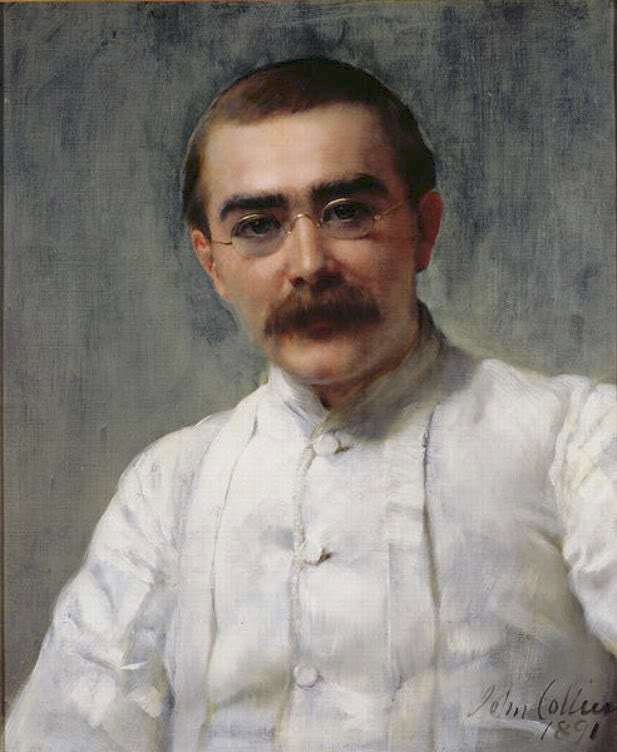
Rudyard Kipling (1865-1936) was a so-called Anglo Indian, born in then-named Bombay during the height of the Indian Raj in 1865. By some contemporary accounts he was simply another jingoistic imperialist, and some of his views are distinctly off-key, for example he described the Irish as “writing dreary poetry…deprived of love of line or knowledge of colour.” He was an early friend of Oswald Mosely, and had a visceral hatred of Communism, at the same time believing that the new Labour Party was a communist front for Moscow. He later distanced himself from Mosely though, both politically and emotionally, describing him as “a bounder and an arriviste.” Kipling was also an enthusiastic Freemason which can be perceived as a social good or social crime depending on one’s own bounded perspective. That said, he was and is a product of his time, and was a brilliant wordsmith: His books and novels include the Jungle Book stories, my first ever film at age five, and The Man Who Would be King, another early film for me, starring Michael Caine and Sean Connery. He was also a prolific, even obsessional, poet, writing hundreds of poems.
I choose his poem ‘If’, which he wrote around 1895, for this short post, and there is a nice narration of the poem by Michael Caine on YouTube. The lines and words resound with me because they double as simple advice for developing ‘resilience’ in life. Indeed, Kipling wrote the poem as a form of paternal advice to his son John. John was killed at the battle of Loos in 1915, which not only broke Kipling’s heart of course but for which he indeed felt personally responsible, because he had used his contacts to get John a commission in the Irish Guards, despite him having failed at least two army and navy medical examinations ruling him unfit to fight. John was last seen by his comrades blindly stumbling through the potholes of the front line on 27 September 1915 and his body was not found until 1992, and officially identified, through DNA and dental records, in 2015.
I use the term ‘resilience’ above with care and and specific meaning. Resilience is not just about hardness or toughness though these may manifest at times, it is about developing a kind of semi-permeable skin to help allow and indeed develop empathy, understanding and warmth with and amongst others whilst at the same time providing deflection and blocking of the brickbats of life; the slings and arrows or outrageous fortune, as Hamlet rued.
If (1895)
If you can keep your head when all about you
Are losing theirs and blaming it on you;
If you can trust yourself when all men doubt you,
But make allowance for their doubting too:
If you can wait and not be tired by waiting,
Or being lied about, don’t deal in lies
Or being hated don’t give way to hating,
And yet don’t look too good nor talk too wise;
If you can dream – and not make dreams your master;
If you can think – and not make thoughts your aim,
If you can meet with Triumph and Disaster
And treat these two imposters the same
If you can bear to hear the truth you’ve spoken
Twisted by knaves to make a trap for fools
Or watch the things you gave your life to, broken
And stoop and build ’em up with worn-out tools;
If you can heap all of your winnings
and risk it on one turn of pitch-and-toss,
And lose, and start again at your beginnings
And never breathe a word about your loss:
If you can force your heart and nerve and sinew
To serve your turn long after they have gone,
And so hold on when there is nothing in you
Except the Will which says to them: ‘Hold on!’
If you can talk with crowds and keep your virtue,
Or walk with Kings – nor lose the Common Touch,
If neither foes nor loving friends can hurt you,
If all men count on you, but none too much:
If you can fill the unforgiving minute
With sixty seconds’ worth of distance run,
Yours is the Earth and everything in it,
And – which is more – you’ll be a Man, my son.
In summary, this is a poem to celebrate humility, self-discipline and productive stoicism.
————————————-